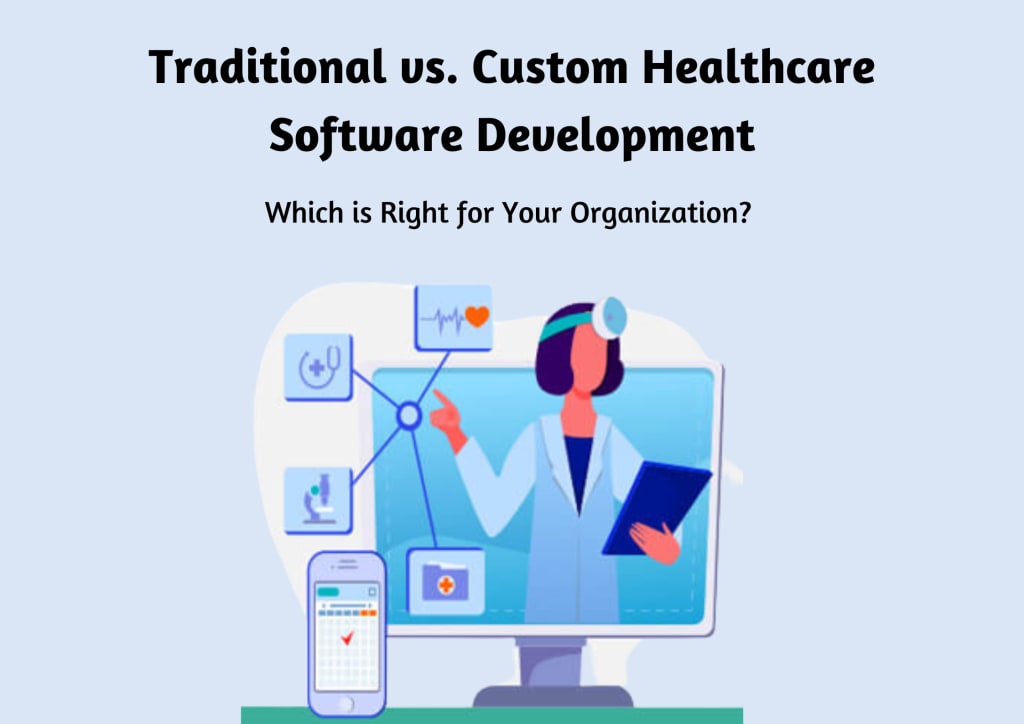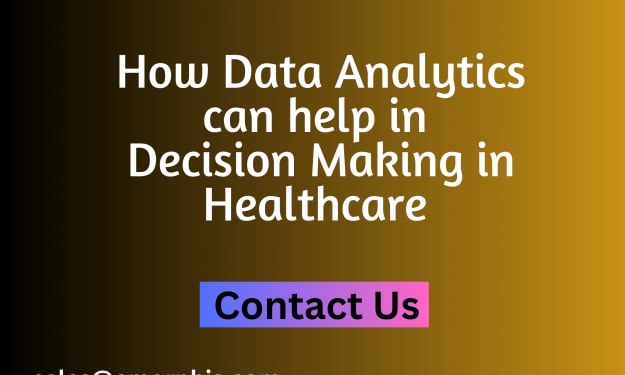Traditional vs. Custom Healthcare Software Development: Which is Right for Your Organization?
Healthcare Software Development

Traditional software development
Traditional software development is a structured and linear approach to software development that has been widely used for many years. This approach is often referred to as the "waterfall" model, as it follows a sequential process where each phase of the software development life cycle (SDLC) flows downstream into the next.
The traditional software development process typically begins with a planning phase, where the goals and requirements of the software are defined. This phase may involve gathering input from stakeholders, identifying risks and constraints, and creating a project plan that outlines the timeline and budget for the project.
Custom Healthcare Software Development
Custom healthcare software development is the process of creating software specifically designed to meet the unique needs of healthcare organizations. Unlike off-the-shelf software, custom healthcare software is built from the ground up to address the specific requirements and workflows of a particular healthcare organization.
Custom healthcare software can be used for a variety of purposes, including electronic medical records (EMRs), remote patient monitoring app, medical billing and coding systems, and clinical decision support systems. By creating software that is tailored to the needs of a particular healthcare organization, custom healthcare software development can help improve efficiency, reduce errors, and improve patient outcomes.
The process of custom healthcare software development typically begins with a needs assessment, where the healthcare organization identifies the specific requirements and goals for the software. This may involve conducting interviews with stakeholders, observing workflows, and analyzing data to identify areas where software can help improve efficiency and patient outcomes.
Once the needs assessment is complete, the development team begins the design phase, where the software architecture, components, and features are defined in detail. This may involve creating wireframes, technical specifications, and other documentation to guide the development team.
Know the Difference Between Traditional & Custom Healthcare Software Development
The main difference between traditional software development and custom healthcare software development is that custom healthcare software development is specifically designed to meet the unique needs of healthcare organizations, while traditional software development is a more general approach that can be applied to any industry or use case.
Traditional software development typically follows a structured and linear approach to software development, often referred to as the "waterfall" model. This involves a sequential process where each phase of the software development life cycle flows downstream into the next, starting with planning and requirements gathering, moving on to design and implementation, and ending with testing, deployment, and maintenance.
Custom healthcare software development follows a similar process, but with a focus on meeting the specific requirements and workflows of healthcare organizations. This may involve conducting a needs assessment to identify the specific requirements and goals for the software, creating wireframes and technical specifications, and building the software using a variety of programming languages and tools.
Another key difference between traditional software development and custom healthcare software development is the level of regulatory compliance required in healthcare. Healthcare organizations must comply with a variety of regulations, including HIPAA and FDA regulations, which can impact the development and deployment of healthcare software. Custom healthcare software development must take these regulations into account and ensure that the software meets all necessary compliance requirements.
Categories of custom healthcare software
There are several categories of custom healthcare software, each designed to address specific needs within the healthcare industry. Here are some of the main categories:
Electronic Medical Records (EMRs): EMRs are digital versions of patients' medical records, which can be accessed and updated by authorized healthcare providers. Custom EMR software can be tailored to the specific needs of a healthcare software development service provider company, allowing for more efficient and accurate record-keeping.
Practice Management Software: Practice management software is designed to help healthcare providers manCage their administrative tasks, such as scheduling appointments, billing, and insurance claims. Custom practice management software can be designed to meet the specific needs of a healthcare organization, improving efficiency and accuracy.
Telemedicine Software: Telemedicine software allows healthcare providers to conduct virtual consultations with patients, using video conferencing and other technologies. Custom telemedicine software can be designed to meet the unique needs of a healthcare organization, such as integrating with existing EMRs and practice management systems.
Medical Imaging Software: Medical imaging software is used to capture and analyze medical images, such as X-rays and CT scans. Custom medical imaging software can be designed to meet the specific needs of a healthcare organization, such as integrating with existing PACS (Picture Archiving and Communication System) systems.
Clinical Decision Support Systems (CDSS): CDSS are designed to help healthcare providers make more informed decisions by providing them with relevant patient data and clinical guidelines. Custom CDSS can be designed to meet the specific needs of a healthcare organization, such as integrating with existing EMRs and clinical workflows.
Conclusion
Emorphis Technologies is a software development company that provides healthcare software development services. Emorphis Technologies has a team of experienced developers who specialize in healthcare software development and have a deep understanding of the unique needs and challenges faced by healthcare providers.
In addition to healthcare software development, Emorphis Technologies also offers a range of IT integration services, including mobile app development, web development, and cloud solutions. Their team of experts can provide customized solutions tailored to the specific needs of their clients.
About the Creator
Larisa Albanians
Hey, a healthcare technology solutions provider at emorphis, that is helping organizations to deliver better healthcare solutions.






Comments
There are no comments for this story
Be the first to respond and start the conversation.